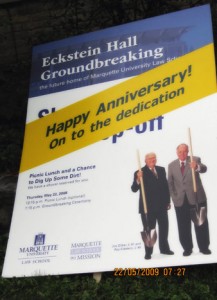 So read the sign this morning on my front lawn, surrounded by some 14 shovels. The reference, of course, is to Ray and Kay Eckstein Hall, the $85 million new law facility on which Marquette University broke ground a year ago today and which is scheduled to open in summer 2010. The groundbreaking was a memorable event, with more than 800 individuals attending and each being given a shovel to help dig. We intended by this democratic gesture—not just the president, dean, and major donors, but everyone wielding a shovel—to signify that Eckstein Hall will be a resource for the entire community. The speeches by Chief Justice Shirley S. Abrahamson, Seventh Circuit Chief Judge Frank H. Easterbrook, and Trustee Natalie A. Black, along with Father Wild as president, added to the occasion, not least because of their crispness. While the groundbreaking event is preserved in a sense in the pages of the Marquette Law Review, the focus over the past year has been on the construction and the coming building. Professor Michael McChrystal’s interview in Marquette Lawyer and April blog post concerning the building should give some sense as to why we expect that this will be the best law school building in the country. The Law School’s webpage devoted to the building project contains further information, including a time-lapse video that shows the progress over the past 365 days. All is well, except for the fact that I do not know who put those things on my front lawn this morning.
So read the sign this morning on my front lawn, surrounded by some 14 shovels. The reference, of course, is to Ray and Kay Eckstein Hall, the $85 million new law facility on which Marquette University broke ground a year ago today and which is scheduled to open in summer 2010. The groundbreaking was a memorable event, with more than 800 individuals attending and each being given a shovel to help dig. We intended by this democratic gesture—not just the president, dean, and major donors, but everyone wielding a shovel—to signify that Eckstein Hall will be a resource for the entire community. The speeches by Chief Justice Shirley S. Abrahamson, Seventh Circuit Chief Judge Frank H. Easterbrook, and Trustee Natalie A. Black, along with Father Wild as president, added to the occasion, not least because of their crispness. While the groundbreaking event is preserved in a sense in the pages of the Marquette Law Review, the focus over the past year has been on the construction and the coming building. Professor Michael McChrystal’s interview in Marquette Lawyer and April blog post concerning the building should give some sense as to why we expect that this will be the best law school building in the country. The Law School’s webpage devoted to the building project contains further information, including a time-lapse video that shows the progress over the past 365 days. All is well, except for the fact that I do not know who put those things on my front lawn this morning.
 This is my final posting as the Faculty Blogger for the Month of May. Thanks to everyone who has commented on my posts and a special thanks to my colleague Michael O’Hear.
This is my final posting as the Faculty Blogger for the Month of May. Thanks to everyone who has commented on my posts and a special thanks to my colleague Michael O’Hear.

